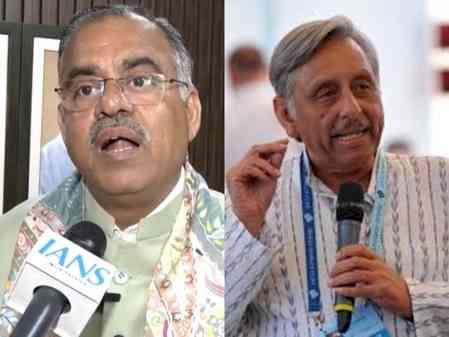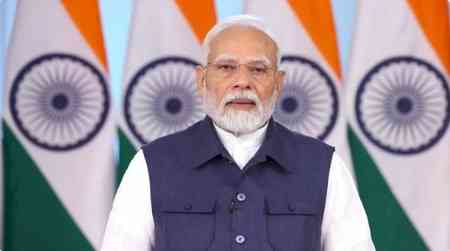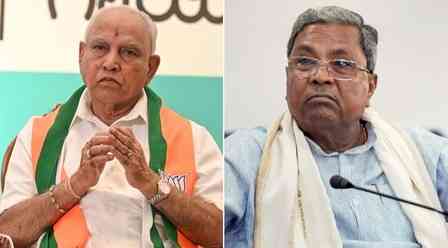Central Government is taxing people for voting for BJP: Raghav Chadha
Raising questions on partial amendment in indexation in Rajya Sabha on Wednesday, Aam Aadmi Party (AAP) MP Raghav Chadha said the Modi government is taxing the people of the country for voting for the BJP. The only mission of the government is to collect tax. The people of the country are being taxed on everything, including waking up and sleeping, laughing and crying, eating and drinking, studying and medicine, buying and selling, road and air travel, earning and sweets.

New Delhi, August 7, 2024: Raising questions on partial amendment in indexation in Rajya Sabha on Wednesday, Aam Aadmi Party (AAP) MP Raghav Chadha said the Modi government is taxing the people of the country for voting for the BJP. The only mission of the government is to collect tax. The people of the country are being taxed on everything, including waking up and sleeping, laughing and crying, eating and drinking, studying and medicine, buying and selling, road and air travel, earning and sweets.
On the amendment brought by the Finance Ministry in the Finance Bill, Raghav Chadha said that this is a minor amendment as only those investors who buy land and buildings before 23 July 2024 will get the benefit of indexation. Any property bought after 23 July 2024 will not be benefitted by indexation. He demanded from the Union Finance Minister to reimplement 100% indexation on all types of investments as before.
Expressing his views on the issue of indexation in Rajya Sabha, AAP MP from Punjab Raghav Chadha said a few days ago we had presented our views on indexation in tax. Our suggestion was accepted by the Union Finance Minister and the indexation that was taken away from the country's investors two weeks ago has been restored. This raises a big question mark on the tax policy of our Government of India, how confused our country's tax policy is. “On 23 July 2024, the central government says that it is withdrawing indexation from the investors of India, but on 6 August it reversed its decision and said that indexation will not be withdrawn, but it will be implemented again. This situation makes it clear that when the government will get the budget prepared by people who do not have knowledge of economics, then such irregularities will be seen,” he said.
Raghav Chadha said that taking away indexation from the investors of India is like breaking their back. I had earlier demanded the complete restoration of indexation in the House, but the Finance Ministry has talked about reimplementing indexation only partially in the proposal to amend the Finance Bill. In this, indexation is not being rolled back on all types of properties, but it is being reapplied only on immovable properties like land and building. Apart from this, the benefit of indexation will not be available on properties purchased after 23 July 2024.
Raghav Chadha requested the central government to completely restore indexation. “It should be applied to all types of properties and properties purchased after 23 July 2024 should also get its benefit. Abolishing indexation on asset classes raises questions on the Finance Minister whether she does not believe in inflation-adjusted benefits and does she not have knowledge of the impact of inflation. Lack of indexation will lead to higher tax burden on investors,” he stated.
The AAP Member of Parliament also said that the government should return full indexation on all types of properties and there should be no date limit for properties purchased before and after July 23, 2024. Inflation is affecting the country's economy, and hence indexation is imposed on inflation-adjusted profits. He warned that this type of amendment in the Finance Bill will not give any boost to the real estate market. “This will lead to a decline in the resale market of the property, rent will increase due to non-sale of houses and people's expenses will increase. This will also reduce foreign investment in the coming time,” he cautioned.
Raghav Chadha said that the government has increased the short-term capital gains tax from 15% to 20% and the long-term capital gains tax from 10% to 12.5%, which has weakened the position of all investors, small and big. He supported the demand of Union Minister Nitin Gadkari to remove 18% GST on life and health insurance. Raghav Chadha said that the government is increasing the tax burden on the common man due to the problems of inflation and multiple taxation.
Expressing concern over the condition of the country's taxpayers, Raghav Chadha said that the only mission of the government is to collect taxes. Putting forth his point of multiple taxation, he said, “The commission of the government is tax. There’s tax on waking up, tax on sleeping, tax on laughing, tax on crying, tax on eating, tax on drinking, tax on children's education, tax on medicines for the elderly, tax on sowing of crops, tax on rail and air travel, tax on buying, tax on selling, tax on spreading, tax on road, tax on sky, tax on vehicle, tax on house, tax on dreams, tax on desires, tax on happiness, tax on smile, tax on hard-earned money day and night, tax on books, tax on ink, tax on vegetables, tax on soil, tax on sweets. The government is collecting tax from the public for having fallen in love with BJP.”
Raghav Chadha tweeted on X, “Partial restoration of indexation is not enough. Indian investors and the middle class are demanding a complete restoration of indexation. First, the central government should provide indexation benefits on properties purchased even after July 24, 2024. Second, provide indexation benefits on all types of assets, not just immovable property. The abolition of indexation benefits on all asset categories, including immovable properties, purchased after July 24, 2024, raises the question of whether the Finance Minister does not believe in the basic economic principle of inflation-adjusted profit or whether it is no longer relevant in an inflation-affected country like India. Abolishing indexation means that taxpayers cannot change the profit from their investments according to inflation, resulting in them paying more tax. This reduces the real return on their investments and makes it more challenging to maintain their assets under inflationary pressure, which is a persistent problem in India.”


 City Air News
City Air News 









